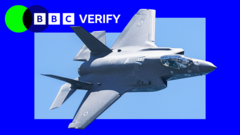As the war in Gaza escalates, questions surrounding the UK's military support to Israel are on the rise. Foreign Secretary David Lammy has publicly condemned Israeli actions and expressed concern over the UK’s part in potentially exacerbating the conflict. Recent calls for transparency amplify scrutiny ahead of any changes in policy.
Gaza Conflict: UK's Role in Military Support to Israel Under Scrutiny

Gaza Conflict: UK's Role in Military Support to Israel Under Scrutiny
Increasing criticism of UK's arms links with Israel amid ongoing Gaza war tensions.
The UK has faced mounting pressure regarding its arms sales to Israel, with Foreign Secretary David Lammy condemning Israel’s military conduct in Gaza. He voiced dismay at the global community’s inability to halt the violence, particularly citing the recent killings of Palestinians in aid centers by Israeli forces. The UK has approved over £500 million ($676.4 million) of arms export licenses to Israel since 2015, although its significance is overshadowed by the U.S. as the main arms supplier.
While parts for the F-35 fighter jet—extensively utilized by the Israeli Defense Forces in the conflict—constitute a notable aspect of UK exports, the current Labour government suspended 30 arms export licenses last year, although components for the F-35 were exempted. Critics, including Professor Anna Stavrianakis, argue this creates a concerning loophole, enabling the continued provision of UK-made parts to Israel.
Moreover, the UK has been involved in providing military training to Israeli troops, with limited numbers participating in non-combat courses within the UK. Despite some training efforts, the government insists it is not sharing military intelligence with Israel relating to the Gaza conflict.
After the recent change in government, UK policy has shifted towards increased criticism of Israel, with Lammy introducing sanctions against certain Israeli officials. However, comprehensive measures against Israel’s actions during the Gaza war remain absent despite significant casualties reported.
The future of UK-Israel military relations persists under rigorous examination as public outcry for accountability and transparency continues to grow amidst the ongoing humanitarian crisis in Gaza.
While parts for the F-35 fighter jet—extensively utilized by the Israeli Defense Forces in the conflict—constitute a notable aspect of UK exports, the current Labour government suspended 30 arms export licenses last year, although components for the F-35 were exempted. Critics, including Professor Anna Stavrianakis, argue this creates a concerning loophole, enabling the continued provision of UK-made parts to Israel.
Moreover, the UK has been involved in providing military training to Israeli troops, with limited numbers participating in non-combat courses within the UK. Despite some training efforts, the government insists it is not sharing military intelligence with Israel relating to the Gaza conflict.
After the recent change in government, UK policy has shifted towards increased criticism of Israel, with Lammy introducing sanctions against certain Israeli officials. However, comprehensive measures against Israel’s actions during the Gaza war remain absent despite significant casualties reported.
The future of UK-Israel military relations persists under rigorous examination as public outcry for accountability and transparency continues to grow amidst the ongoing humanitarian crisis in Gaza.





















